Recap & Photos: Roadhouse Tomato Dinner Featuring Author Amelia Saltsman
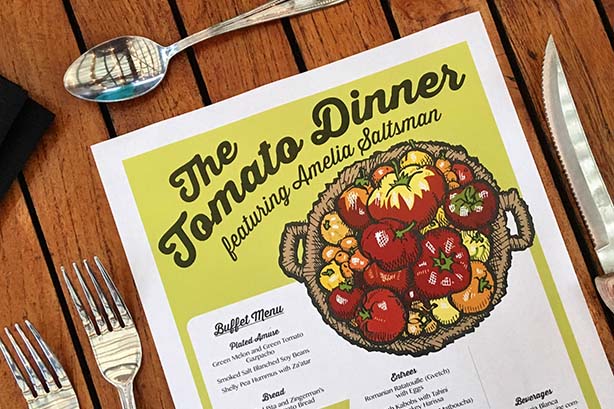
When we think about traditional food, we tend to view it as something complex, as something toiled over. An image comes to mind of an Italian grandmother, rolling out the dough for pasta, painstakingly shaping it. There is familial warmth and a dusting of flour, hands work the dough and words of encouragement are laid down as it’s stretched out on a drying rack, the grandmother hoping to pass on her technique to her family. It is the endeavors that people put into making food that makes it taste so good, that work into the historical character of a regional dish.
When we consider foodways and a desire to get back to traditional methods of creating cultural recipes, it can seem overwhelming and elaborate, leading to a belief that not just anyone can cook anything so rooted in our past. While Ari Weinzweig definitely challenges this belief cycle in his latest book, Zingerman’s Guide to Good Leading Part 4: A Lapsed Anarchist’s Approach to the Power of Beliefs in Business, there is another author who connects the past with a contemporary approach to food and cooking while protecting the integrity of time-honored cuisine. Amelia Saltsman, the author of the Seasonal Jewish Cooking: A Fresh Take on Tradition cookbook, brought a profound perspective on how we regard food and traditional cooking during our Tomato Special Dinner #200 at Zingerman’s Roadhouse earlier this month.
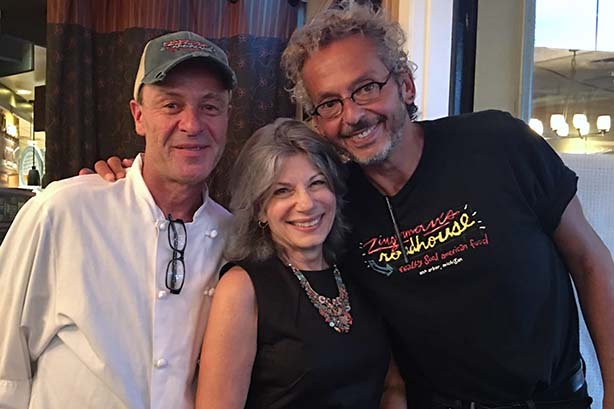
Amelia Saltsman with Chef Alex Young and Ari
The foremost idea that Amelia reminded us of is that cooking good food started in a territory sense. Historically, people cooked what was available to them, locally and seasonally. When we get back to our roots, by embracing what is right in front of us, we can welcome the idea that simple ingredients will bring the best flavor. We do this at Zingerman’s Roadhouse with our menu when we explore various foodways and focus on what makes them unique. By incorporating ingredients that represent the character of their regions and their producers into our dishes, we protect their integrity.
While it sounds straightforward in theory, many cuisines have transcended into something more global as cultures have expanded over time. Taking just into consideration, for example, the cultural crossroads of the United States, Amelia muses that “food morphs into something that is bigger than the sum of its parts.” While she intends with her book to explore Jewish food as a regional, cultural cuisine, she admits that there is not just one region to promote. She contradicts a romanticized notion of Jewish culture that stems from just one facet, when in truth, it is richly layered by so many different regions and sub-regions, each place having a different impact on flavor based on the ingredients that are within reach.
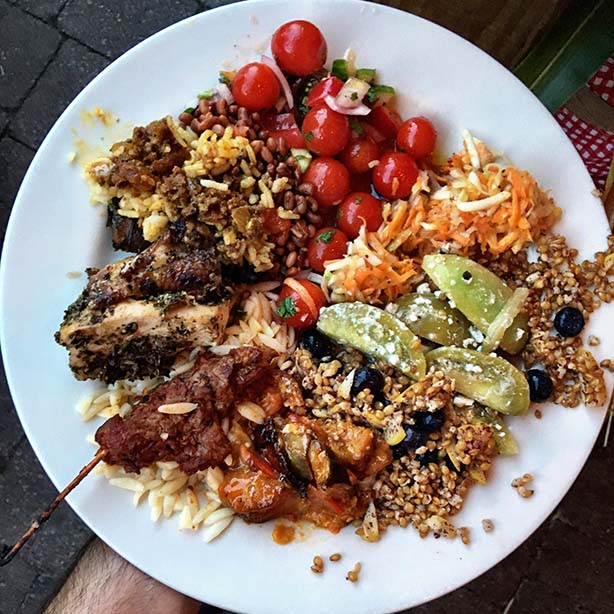
Coming from a mixed background (Syrian, Iraqi and Romanian), Amelia embodies the intricacy of the different paths that Jewish cuisine has taken. With her book, she conveys the idea that by opening up to the diversity of Jewish food, she is unlocking the depth and flavors of a myriad of places. She says that when we think about variegated heritage, it is important to remember that “it is not the hallmark card of what we think culture looks like.” She is connecting the memories and stories of people from all over and questioning the idea that Jewish food is just one type of cuisine.
Concerned that some believe Jewish cuisine is heavy or bland, Amelia insists it actually stems from a history that holds treasures of flavors that are waiting to be unearthed. She shared a memory of her Romanian grandfather making salata de icre (known as ikra in Israel), a spread made with cured fish roe emulsified with oil and lemon. The result, she says, is a briny, creamy delicate spread that is exquisite when layered on black bread with a little bit of garlic. Top it off with fresh tomatoes and cucumbers from your garden, and it becomes a heavenly alternative to processed mayo. By digging up recipes like ikra, we can tap into the abundance of flavor that is present in Jewish cuisine.
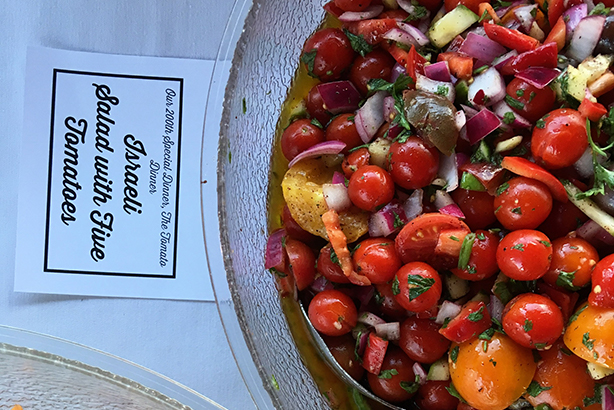
Amelia also touched on the importance of agriculture. She talks about the “beautiful synchronicity of the 21st century sustainable approach to our food with ancient traditions and blessings”, how the seasons roll together with the holidays and the harvest. Her book is divided into six micro-seasons that tie together Jewish traditions with the earth’s annual cycles. Farming itself, she says, is an ancient art, but many of the practices are are still sound.
Just as The Roadhouse’s Chef Alex Young focuses on the importance of terroir, people can continue to produce food that is healthful, yet full of flavor. By paying attention to what is immediately around us, we can discover that the ingredients in food that we source from local farms do not need anything extra. In the same way our ancestors created delicious recipes using what was available to them, we can buy from the local farmers’ market and recreate the satisfying, nutritious meals that seemed so daunting before.
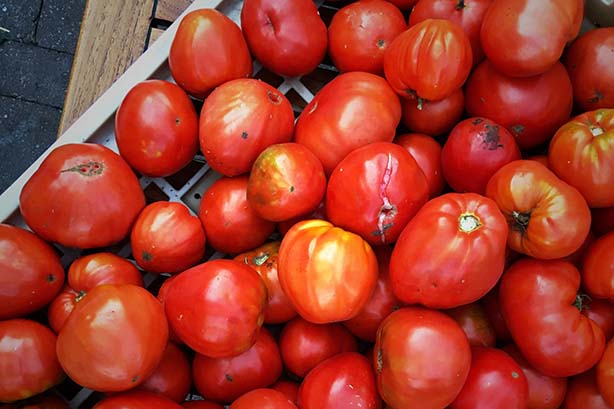
The heirloom tomatoes we brought in from Cornman Farms for the Tomato Dinner are a perfect example of how to achieve this–each variety of tomato brings its own essence of taste with no need for frills. At the dinner we offered really good olive oil and sea salt to enhance the tomatoes, or there was an option to create a Caprese salad with our homemade fresh mozzarella and hand-picked basil. Similarly, Amelia creates her recipes by “letting the ingredients tell her what to do”. While the recipes come from a long-established place in time, she adapts her techniques to a modern sensibilities.
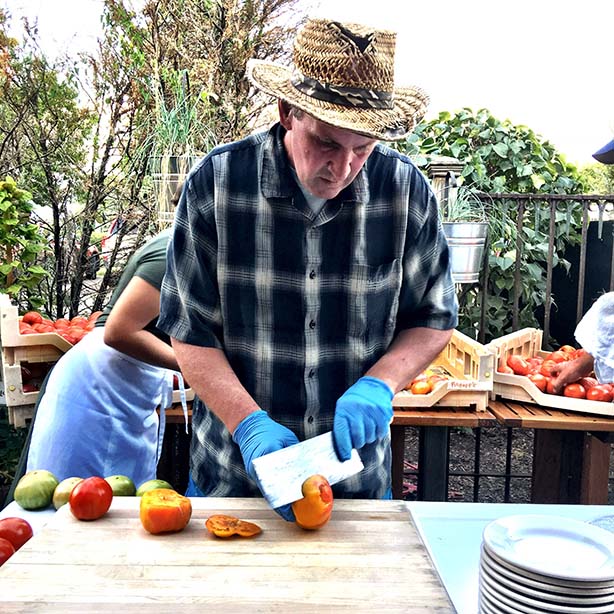
Chef Alex and team hard at work
While nearly all the ingredients used at the dinner came from Cornman, Amelia hand -carried precious strands of golden barhi dates from California, making sure that the just under-ripe fruits stayed delicately intact. Fresh and crisp, with a slightly firm texture, the dates were so unique in comparison to what we typically eat in the Midwest. Chef Alex prepared Amelia’s dates in a luscious wheat berry salad with plump blueberries and a splash of freshly squeezed orange juice. The nuttiness of the wheat berries brought an early autumn subtlety to the dish.
Amelia’s recipes, each one capturing a story from her incredible Jewish heritage, made the Tomato Special Dinner #200 more than just a success—it was a momentous event for Zingerman’s Roadhouse. It was one more opportunity for us to learn about the rich and soulful foodways we are constantly searching out. With Ari and Amelia connecting us with the importance of regional, full-flavored food, and Chef Alex’s talents to incorporate his cherished product from Cornman to recreate the depth of Amelia’s heritage, the Tomato Dinner achieved great heights for our Roadhouse family.
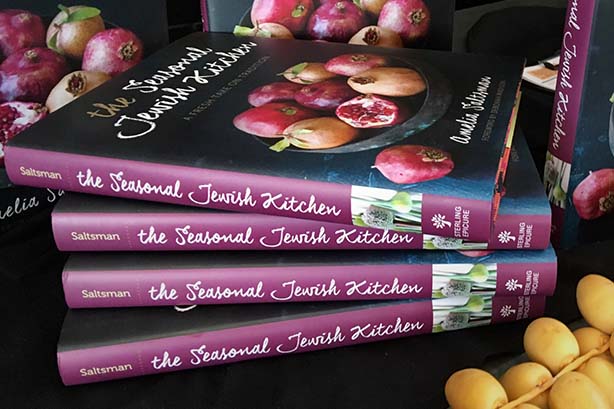
To recreate the delicious recipes we featured at the Tomato Special Dinner #200, pick up a copy of her beautifully written and illustrated cookbook. In the meantime, our heirloom tomatoes from Cornman Farms still brighten many of our dishes at Zingerman’s Roadhouse, so there is still time for you to come in and enjoy them!




Zingerman’s Art for Sale